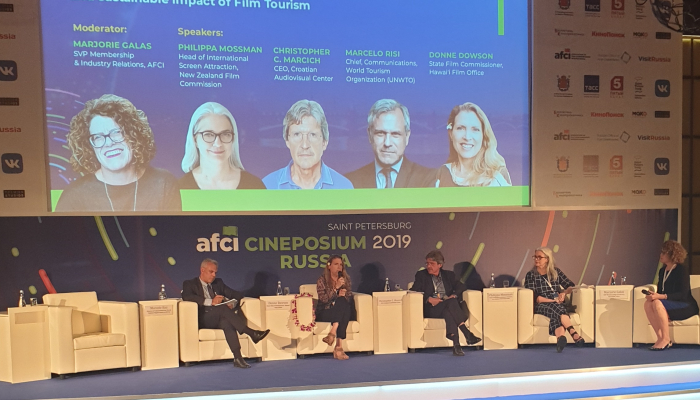43rd edition of Cineposium held in Saint Petersburg

Cineposium, an annual conference of AFCI – the Association of Film Commissioners International, was held on 14 and 15 of September in Saint Petersburg. Panels with prominent speakers discussed key industry topics, and analyses of strategies being implemented by governments throughout the world to increase their country’s share in the film market and television production were presented.
The exceptional content boom was viewed from several key aspects, from production companies and large streaming platforms that produce and distribute content, through the studios and locations where this content is recorded and produced, and ties that in the entire process are represented by film commissions and offices throughout the world.
The role that incentives such as cash/tax rebates have on attracting production, system security, the quality of local film crews and an overview of the realistic situation on the field (film studies and infrastructure, locations, permits) are key elements that ensure quality projects. Jay Roewe (Senior Vice President, West Coast Production, HBO), Tomasz Dabrowski (EMEA Production Policy, Netflix), Ashley Rice (Executive Vice President of Legendary Television & Digital Media) and Nick Smith (Studio Development Specialist, Blackhall Studios), among others, spoke about the content boom.
The start of cooperation between the AFCI and the World Tourism Organization (UNWTO) this year, placed the topic of film tourism in a special focus. Zurab Pololikashvili (General Secretary of the UNWTO) and Marcelo Risi, Communications Director of the UNWTO, as representatives of the tourism sector, as well as Philippa Mossman (International Screen Attraction, New Zealand Film Commission) and Chris Marcich, Chief Executive Officer of the Croatian Audiovisual Centre, on behalf of the film commission that actively participates in attracting projects that produce tourism effects like the trilogy Lord of the Rings or the series Game of Thrones, among other people, spoke about the impact of films and television series on the global recognisability of countries and filming locations, the rise in tourist visits, the branding of regions and cities and the great potential of this branch of tourism.
‘The phenomenon of the series Game of Thrones has put Croatia as a destination on the world map of film tourism. The increase in targeted tourist visits to Dubrovnik has since 2012 onwards, given the global success of the series, been expected. On the other hand, we were surprised by what happened in Zagreb, where the taping of the Korean reality show ‘Romantic’ resulted in an increase of tourist visits from Korea of 52 % in one year. Along with additional activities of the Croatian National Tourist Board, in 5 years in Zagreb there has been an increase in visits from Korea of 800 %’, said Marcich during the panel discussion.
The equal representation of women was a topic of special significance in the film industry too. Helene Granqvist (Women in Film and Television International) presented a specific project, a type of ‘global gender incentive’ that provides a 10 % discount on services for gender equal production projections, while Christen Carr Strubbe (Senior Vice President, Physical Production, Universal Pictures) and Jess Conoplia (President of the AFCI) shared their experience in battling equality in the industry.
The value of the European video game market is € 21 billion, with global video games outselling the film and music industries together. Dr. Jo Twisst OBE (Executive Director of UKIE) and Asad Qizilbash (Head of PlayStation Productions and Vice President for Marketing, PlaySation) spoke about the development of film and television content from the viewpoint of the gaming industry, with a reference to the differences in approach and understanding of production, which at the same time are also the reason for results so far in the adaptation of video games into feature films.
‘While developing the games, you must follow three basic things: the brain, the heart and the hands - what a player thinks, what he/she feels and what hand movement he/she uses when playing. A player him/herself chooses options, where he/she will go from here. Film viewers practically only have one option, the image given to them by the director’, said Asad during the discussion.
Experience from specific projects at locations throughout the world were shared by prominent producers Ian Smith OBE (Mad Max: Fury Road, Children of Men, Killing Fields), Michael Ruben (Narcos, All About My Mother, Talk to Her / Hable con Ella), Per-Henry Borch (Transformers: Last Knight, Harry Potter and the Half-blood Prince), Marco Valerio Pugini (All the Money in the World, Rome, Solo: A Star Wars Story) and Aaron Shershow (Pacific Rim: Uprising, Marco Polo, Man of Tai Chi, The Adventures).
During the conference, the research on Best Practices In Screen Sector Development was presented, which was conducted by Olsberg SPI for the AFCI. It is an analysis of strategies being implemented by governments around the world to increase the share of their countries in the film market and televisions production.
The Croatian Audiovisual Centre with the Department for promoting investments in audiovisual production (Filming in Croatia) has been a member of the AFCI since 2015, while this year the Zagreb Film Office also became a member.
